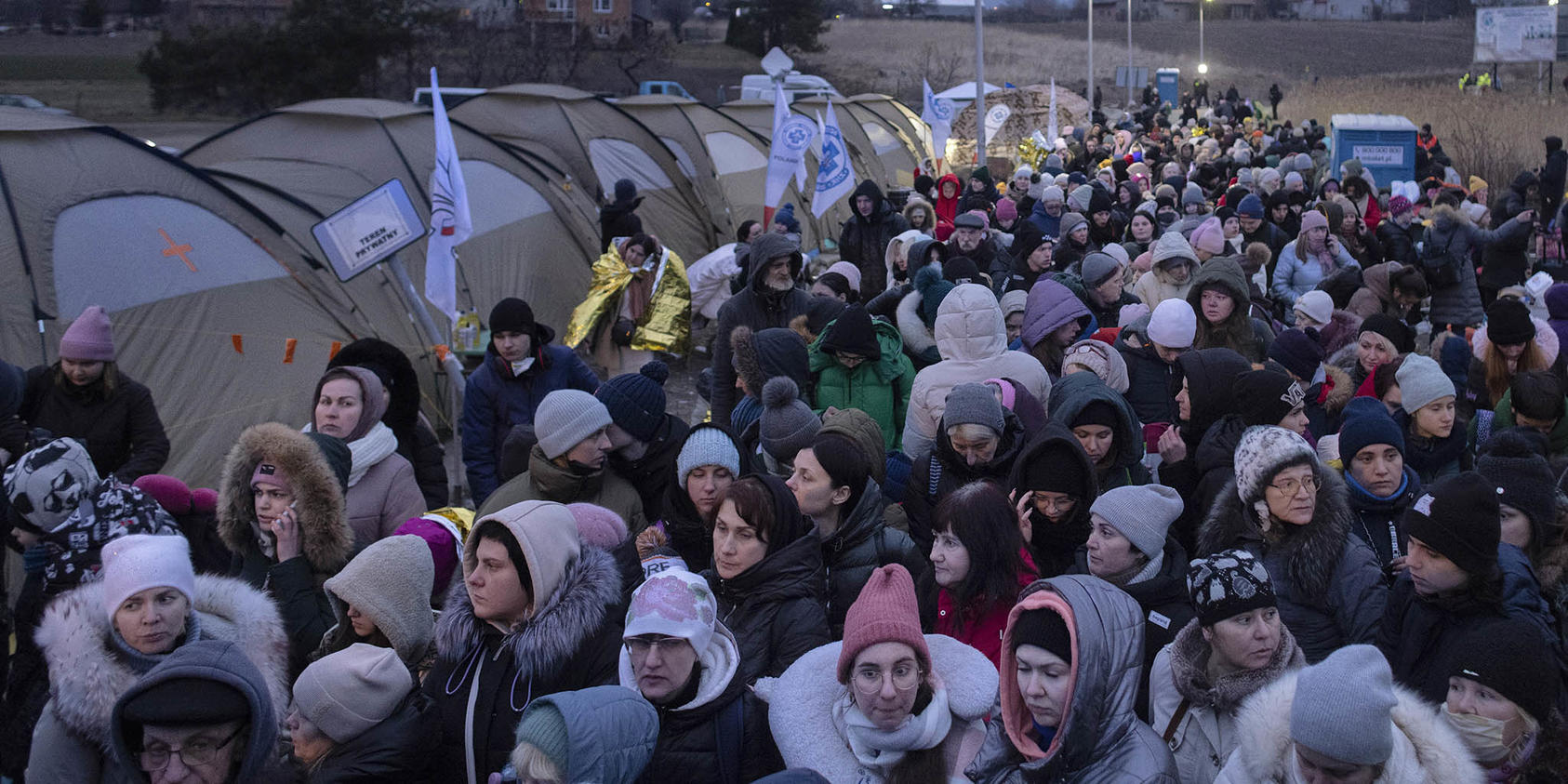
FILE — Refugees from Ukraine wait for a bus after crossing the Polish border to Medyka, on March 7, 2022. Warsaw gladly and proudly accepted 300,000 Ukrainians fleeing the war, but as the Polish capital braces for a new wave of refugees, its mayor warns that the city is “at capacity.” (Maciek Nabrdalik/The New York Times)
NGOCSTIP – Russia’s War Is Fueling Trafficking Crisis and creating a humanitarian catastrophe that extends beyond the battlefield. The United Nations Special Representative on Sexual Violence in Conflict, Pramila Patten, has raised urgent concerns over the growing trend of exploitation, particularly targeting women and children fleeing Ukraine. As millions escape the violence, traffickers exploit chaos, leading to a crisis within a crisis. Refugee centers across Europe are overwhelmed, with vulnerable populations falling prey to predators. The international community is being urged to act quickly to prevent further escalation. Border areas such as Poland and Moldova have reported increased cases of cross-border trafficking, revealing a shadow market preying on displaced civilians. Without a coordinated global response, the long-term impact on human security and dignity will be devastating. As conflict stretches on, so does the threat to basic human rights and the safety of those seeking refuge from war-torn Ukraine.
Increased reports of sexual violence demonstrate how Russia’s War Is Fueling Trafficking Crisis at an alarming pace. UN envoy Patten highlighted horrific acts including gang rape, sexual assaults at gunpoint, and forced pregnancies as emerging war tactics. These acts are not isolated incidents but symptoms of a deliberate strategy that leverages chaos for unchecked abuse. While conflict-related sexual violence is notoriously underreported, documented cases already paint a grim picture.
Patten stated that the figures available only represent the surface of the full extent. With nearly seven million displaced individuals, mostly women and children, traffickers are capitalizing on desperation and fear. In many areas, protection systems are fragile or absent. This crisis demands immediate attention and the implementation of safeguards in refugee centers. Countries receiving refugees must increase efforts to screen volunteers, agencies, and housing services to ensure safety and minimize exploitation. War leaves more than physical scars, especially when bodies become battlegrounds.
“Read about: Game Changer: Mozambique Joins UN’s Blue Heart to Crush Human Trafficking!”
In response to this escalating crisis, the UN has developed a Framework of Cooperation with Ukraine. This strategic agreement targets conflict-related sexual violence and seeks to strengthen prevention and accountability. The five-point agenda includes expanding survivor services, ensuring access to justice, and reforming security sectors. One key goal is embedding protection clauses into any future cease-fire or peace processes. Another focus is tackling human trafficking linked to sexual exploitation, which has increased dramatically during wartime displacement. Patten visited Ukraine, Poland, and Moldova to assess conditions firsthand and strengthen collaboration. Her presence was meant to send a powerful message to both survivors and perpetrators. Victims need to know they are not alone while those who commit these crimes must know they are being watched. Her office will also deploy Women Protection Advisors to support national responses. Without proper intervention, ongoing violence will escalate, compounding trauma and further destabilizing affected communities.
Ensuring justice for victims of war crimes remains a key focus in Patten’s advocacy. She urges authorities to pursue and prosecute perpetrators to break the ongoing cycle of abuse. In her address, Patten challenged the UN Security Council to convert existing documentation into concrete legal action. Many still treat sexual violence in war as something inevitable, but that belief must stop. Criminals repeat their actions when systems fail to hold them accountable.
Russia’s invasion brings harm beyond physical territory and devastates civilian lives across many regions. Investigators continue to gather testimonies and evidence despite limited access to conflict zones. Survivors struggle with intense shame, fear, and risks of retaliation. Support teams must build safe spaces and offer resources to empower these survivors. Legal systems must act swiftly and avoid dismissing war-related crimes. Consistent action will not only punish wrongdoers but also prevent future atrocities.
“Read more: Experts Swear by This Seasonal Garage Hack, Your Cluttered Space Will Thank You!”
Patten emphasized that in every armed conflict, sexual violence becomes a hidden yet consistent pattern. It is not spontaneous but strategic. The UN’s latest recommendations push for diplomatic, legal, and humanitarian actions to address the root causes. These include integrating sexual violence prevention into all peace agreements, issuing early warnings, and applying sanctions when necessary. Reforms in the justice and security sectors must also include gender perspectives and survivor needs. There is a strong call to amplify survivor voices and recognize that these rights are not regional values but universal ones. As long as the crisis in Ukraine continues, so does the risk for millions. Women and children should not bear the double burden of war and exploitation. The world must unite not only in aid but in principle. Survivors need hope, perpetrators need justice, and peace processes must reflect the reality of those suffering in silence.